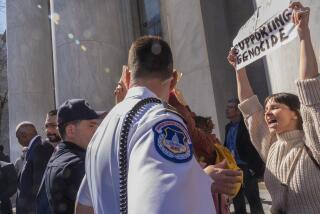‘Genocide as a Political Science’
- Share via
It saddened me to read John K. Roth’s column (“Genocide as a Political Science: Kristallnacht Formula Haunts Today’s Unwanted,” Op-Ed Page, Nov. 12). I cheered when Roth was selected 1988 Professor of the Year for the U.S. and Canada, for as a professor of philosophy and Holocaust studies at Claremont McKenna College, he was drawing from that horrific period of history many lessons, values, and ideas that could help college students clarify their own values and broaden their own understanding.
Roth’s present article, however, suggests that there is a legitimate comparison between the German extermination of 6 million Jews and the Israeli treatment of Arabs in the present phase of the Arab-Israeli conflict. In each case, he says, the group in power wanted the minority to leave.
These kinds of comparison, especially from respected scholars, in my opinion, only add insult to injury by suggesting that these two situations have anything at all in common--other than the fact that two groups of people are involved.
It is almost too obvious to mention that in the case of Kristallnacht and the Holocaust in general, there was a conscious government policy to exterminate an entire people and with it an entire culture, solely because the group members were Jewish. In the case of Israel and the Arabs, there is not, thank God, any such government policy, and in fact Rabbi Meier Kahane’s Kach party was banned by the Israeli government because it was racist and it recommended the transfer of Arab residents to another location.
The conflicts caused by two groups of people who want to live in the same geographical location are necessarily fraught with severe difficulties, and those of us who watch the current situation are saddened by the profound pain on both sides. Although we may not agree with every decision of the Israeli government, Israeli policy is a far cry from a rather unique government decision to exterminate an entire people.
Roth has taken two entirely different sets of circumstances and attempted to make them sound similar. Someone who has done so much good should know better.
ROBERTA GILLERMAN
Los Angeles
More to Read
Sign up for Essential California
The most important California stories and recommendations in your inbox every morning.
You may occasionally receive promotional content from the Los Angeles Times.










